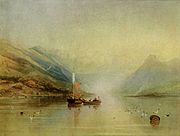- Copley Fielding
-
 Antony Vandyke Copley Fielding by William Boxall (exhibited 1843)
Antony Vandyke Copley Fielding by William Boxall (exhibited 1843)
Anthony Vandyke Copley Fielding (November 22, 1787 – March 3, 1855), commonly called Copley Fielding, was an English painter born in Sowerby, near Halifax and famous for his watercolour landscapes. At an early age Fielding became a pupil of John Varley. In 1810 he became an associate exhibitor in the Old Water-colour Society, in 1813 a full member and in 1831 President of that body (later known as the Royal Society of Watercolours), until his death. In 1824 he won a gold medal at the Paris Salon alongside Richard Parkes Bonington and John Constable. He also engaged largely in teaching the art and made ample profits. He later moved to Park Crescent in Worthing and died in the town in March 1855.
Copley Fielding was a painter of much elegance, taste and accomplishment and has always been highly popular with purchasers. He painted a vast number of all sorts of views (occasionally in oil-color) including marine subjects. Specimens of his work from 1829 to 1850 can be seen in the water-colour gallery of the Victoria and Albert Museum and other major museums. Among the engraved specimens of his art is the Annual of British Landscape Scenery, published in 1839.
Gallery
Lake Scene by Copley FieldingReferences
- This article incorporates text from a publication now in the public domain: Chisholm, Hugh, ed (1911). "Fielding, Anthony Vandyke Copley". Encyclopædia Britannica (11th ed.). Cambridge University Press.
- S.C. Kaines Smith, 'A.V.C. Fielding', OWS Club, III, 1925-6, pp 8–30
- John Ramm, 'In Search of Nature', 'Antique Dealer & Collectors Guide', May 1999, Vol 52, No.10
External links
- Works by Copley-Fielding at the Tate Gallery
- Works by Copley-Fielding at the Louvre
- Works by Copley-Fielding at The Queen's Art Collection
- Works by Copley-Fielding at Victoria & Albert Museum

This biographical article about a painter from the United Kingdom is a stub. You can help Wikipedia by expanding it.

